英语辩论赛不能不懂的知识
英语辩论知识点

IntroductionEnglish debating is a multifaceted skill that requires a deep understanding of argumentation, critical thinking, public speaking, and knowledge of the chosen topic. It is an intellectual exercise that fosters the ability to articulate ideas clearly, persuasively, and logically. In this comprehensive guide, we will delve into various aspects of English debating, providing insights, strategies, and techniques to help you excel in this challenging yet rewarding activity. The discussion will be divided into several key areas: understanding debate formats, conducting thorough research, constructing compelling arguments, delivering effective speeches, engaging in rebuttals, and adhering to ethical standards.1. Understanding Debate FormatsEnglish debates can take various forms, each with its unique rules, structures, and objectives. Familiarity with these formats is crucial for success:a. **Parliamentary Debating**: This format follows a structured parliamentary procedure, often involving multiple teams and speakers. Key roles include the Prime Minister (who presents the motion), the Opposition Leader (who opposes it), and the Whip (responsible for timekeeping). Debates typically begin with opening speeches, followed by points of information, and conclude with closing arguments.b. **British Parliamentary (BP) Debating**: A popular variant, BP involves four teams of two speakers each (Government, Opposition, Government Shadow, and Opposition Shadow). Debaters must respond to unseen motions, often with limited preparation time, and engage in spontaneous argumentation and rebuttal.c. **Lincoln-Douglas (LD) Debating**: Focusing on moral or philosophical issues, LD debates are one-on-one contests where each debater presents an opening statement, cross-examines their opponent, delivers a rebuttal, and concludes with a final focus speech.d. **Public Forum (PF) Debating**: Designed for accessibility and audienceengagement, PF debates involve teams of two presenting arguments on current events or policy issues. Debaters give constructive speeches, cross-examine opponents, and deliver rebuttals and summaries.Understanding the specific requirements, timing constraints, and strategic nuances of your chosen format is essential for crafting a winning strategy.2. Conducting Thorough ResearchA strong foundation of knowledge is vital in English debating. To build this foundation:a. **Identify Key Sources**: Utilize academic journals, reputable news outlets, government reports, and expert opinions to gather accurate, up-to-date information on your topic. Be wary of biases and ensure sources are credible.b. **Analyze Data**: Interpret statistical data, case studies, and empirical evidence to support your arguments. Learn to recognize patterns, trends, and correlations that bolster your position.c. **Anticipate Counterarguments**: Study opposing viewpoints and anticipate potential objections to your arguments. Develop counterpoints or concessions that address these challenges effectively.d. **Organize Information**: Create a clear outline or mind map to organize your research, grouping relevant facts, examples, and quotes under each of your main arguments. This will facilitate efficient retrieval during the debate.3. Constructing Compelling ArgumentsCrafting persuasive arguments is at the heart of successful debating. Follow these guidelines:a. **Develop a Clear Thesis**: Your thesis should encapsulate your stance on the debate topic in a concise, assertive statement. It should be specific, defensible, and directly responsive to the motion.b. **Employ Logical Structure**: Present your arguments in a logical sequence, typically starting with your strongest point and progressing to weaker ones. Each argument should have a clear premise, evidence, and conclusion.c. **Utilize Rhetorical Devices**: Employ rhetorical techniques likeanalogies, anecdotes, rhetorical questions, and appeals to emotion to enhance the impact of your arguments. However, ensure these devices do not undermine the logical integrity of your case.d. **Address Counterarguments**: Anticipate and refute opposing viewpoints proactively, demonstrating that you have considered alternative perspectives and found them insufficient or flawed.e. **Provide Concrete Solutions**: Where applicable, offer feasible solutions or policy recommendations that align with your thesis, further solidifying your position.4. Delivering Effective SpeechesMastering the art of public speaking is crucial for conveying your arguments persuasively:a. **Engage Your Audience**: Establish eye contact, use expressive gestures, vary your tone and pace, and employ humor when appropriate to captivate your listeners.b. **Adhere to Time Limits**: Respect the allotted speaking time and structure your speech accordingly. Practice time management during preparation to ensure you cover all key points within the given timeframe.c. **Speak Clearly and Concisely**: Use simple, precise language and avoid jargon or overly complex sentences. Pause for emphasis and clarity, and enunciate words distinctly.d. **Use Visual Aids (if allowed)**: Where appropriate, utilize visual aids such as slides, graphs, or props to reinforce your arguments and maintain audience interest.5. Engaging in RebuttalsRebuttals provide opportunities to challenge your opponents' arguments and reinforce your own position:a. **Listen Carefully**: During your opponents' speeches, actively listen for weaknesses in their arguments, factual inaccuracies, or logical fallacies. Take notes to aid your rebuttal.b. **Focus on Key Points**: Address the most significant flaws or inconsistencies in your opponents' case, rather than nitpicking minor details. Be selective and strategic in your rebuttal.c. **Provide Evidence**: Support your反驳with concrete evidence, statistics, or expert opinions that contradict your opponents' claims. Demonstrate why your evidence is more reliable or relevant.d. **Redirect the Debate**: If possible, use your rebuttal to shift the debate in your favor by exposing the inadequacy of your opponents' arguments and reasserting the strength of your own position.6. Adhering to Ethical StandardsRespectful and fair conduct is essential for maintaining the integrity of the debate:a. **Treat Opponents with Courtesy**: Avoid personal attacks, insults, or derogatory language. Address your opponents respectfully, even in the face of disagreement.b. **Stick to the Topic**: Do not stray from the debate's central theme or introduce irrelevant information. Focus on addressing the motion directly.c. **Cite Sources Properly**: Give credit to authors, researchers, or organizations whose work you reference. Failure to do so constitutes plagiarism and undermines your credibility.d. **Accept Adjudicators' Decisions**: Respect the judgment of the adjudication panel, even if you disagree with their verdict. Use feedback constructively to improve future performances.ConclusionEnglish debating is a multifaceted skill that demands rigorous research, incisive argumentation, effective public speaking, and adherence to ethical standards. By mastering the various aspects discussed in this guide—understanding debate formats, conducting thorough research, constructing compelling arguments, delivering effective speeches, engaging in rebuttals, and adhering to ethical standards—you will be well-equipped to excel in thischallenging and intellectually stimulating activity. Remember, practice, patience, and a commitment to continuous improvement are key to refining your debating prowess and achieving success in this dynamic arena.。
英语辩论赛基本术语(1)
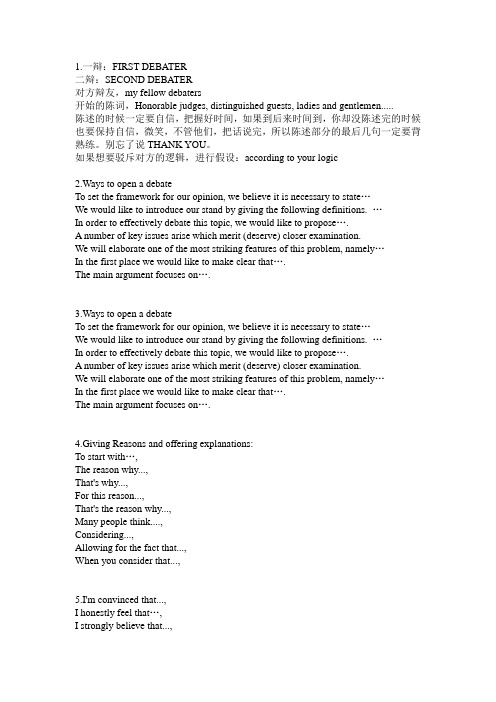
1.一辩:FIRST DEBATER二辩:SECOND DEBATER对方辩友,my fellow debaters开始的陈词,Honorable judges, distinguished guests, ladies and gentlemen.....陈述的时候一定要自信,把握好时间,如果到后来时间到,你却没陈述完的时候也要保持自信,微笑,不管他们,把话说完,所以陈述部分的最后几句一定要背熟练。
别忘了说THANK YOU。
如果想要驳斥对方的逻辑,进行假设:according to your logic2.Ways to open a debateTo set the framework for our opinion, we believe it is necessary to state…We would like to introduce our stand by giving the following definitions. …In order to effectively debate this topic, we would like to propose….A number of key issues arise which merit (deserve) closer examination.We will elaborate one of the most striking features of this problem, namely…In the first place we would like to make clear that….The main argument focuses on….3.Ways to open a debateTo set the framework for our opinion, we believe it is necessary to state…We would like to introduce our stand by giving the following definitions. …In order to effectively debate this topic, we would like to propose….A number of key issues arise which merit (deserve) closer examination.We will elaborate one of the most striking features of this problem, namely…In the first place we would like to make clear that….The main argument focuses on….4.Giving Reasons and offering explanations:To start with…,The reason why...,That's why...,For this reason...,That's the reason why...,Many people think....,Considering...,Allowing for the fact that...,When you consider that...,5.I'm convinced that...,I honestly feel that…,I strongly believe that...,Without a doubt...,While others may argue that…, Considering the current …,It’s safe to say that…,In fact…, It’s a fact that…,A recent study has shown that…,It has been suggested that…,6.Asking for an opinion from the other partyI would be glad to hear your opinion of …我很乐意听听你对……的意见。
英语辩论术语

英语辩论赛常用词汇和表达辩论赛English debating Competition辩论赛事debating event主办host\manage循环赛preliminary debate淘汰赛elimination debate八分之一决赛octofinals四分之一决赛quarterfinals半决赛semifinals决赛grand final正方pro side反方con side正方一辩the first debater of pro side反方一辩the second debater of con side计时员timekeeper评委打分score the competition定义要合理the definition should be reasonable素材要有说服力matter should be persuasive没有平局there is no draws in competitive competition一辩:first debater二辩:second debater对方辩友,my fellow debaters开始的陈词,Honorable judges, distinguished guests, ladies and gentlemen.....如果想要驳斥对方的逻辑,进行假设:according to your logicYou are missing the point!(你没有说重点!你没有围绕中心!即,他在钻洞子,这个时候他很有可能会说漏。
注意,要用are,不能说成You're,因为这样语气,士气就没有了。
)You just don't understand what we talked about!(你根本就没有明白我们刚说了什么!即:误解了,曲解了)You know what? You are straying from the main point!你知道吗?你已经跑题了!(也要注意,都用You are)自由辩论的阶段,可以在他在说的时候,插进去,说“Wait!Wait!You just said……,did you?”(当然这句话要用在,你发现对方说的不正确时~~)You are generalizing what I asked!(你在以偏盖全!即:我要你回答这个,但对方你绕过去了!) Please answer my question!(请不要回避我的问题!请你回答!!)1. stating an opinion 陈述观点a. in my opinion… 我的意见是……b. personally I think…… 我个人认为……c. I believe that…… 我相信……d. I think th at…… 我觉得……e. the point is that…… 我的观点是……f. if you ask me…… 如果你问我……g. I’d like to say this:…… 我会这样说……h. I’d like to point out that 我想指出的是……i. speaking for myself 站在自己的立场上说……j. as far as I’m concerned,… 就我而言,……k. in my experience… 根据我的经验……2. challenging an opinion 质疑某种观点a. that can’t be true 那不可能是真的。
英语辩论赛注意事项
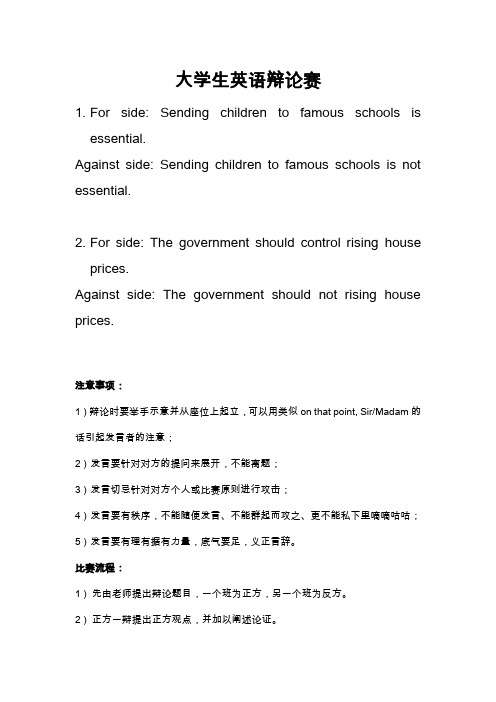
大学生英语辩论赛1.For side: Sending children to famous schools isessential.Against side: Sending children to famous schools is not essential.2.For side: The government should control rising houseprices.Against side: The government should not rising house prices.注意事项:1)辩论时要举手示意并从座位上起立,可以用类似on that point, Sir/Madam的话引起发言者的注意;2)发言要针对对方的提问来展开,不能离题;3)发言切忌针对对方个人或比赛原则进行攻击;4)发言要有秩序,不能随便发言、不能群起而攻之、更不能私下里嘀嘀咕咕;5)发言要有理有据有力量,底气要足,义正言辞。
比赛流程:1)先由老师提出辩论题目,一个班为正方,另一个班为反方。
2)正方一辩提出正方观点,并加以阐述论证。
3)反方一辩提出抗议,并给予有理有据的辩解。
以此类推,正方二辩,反方二辩……4)最后五分钟由双方代表进行总结各自方方的观点和论述。
评分标准1)内容:观点陈述明确,有条理,论点和论据内容是否正确、充实,引用资料和实例是否恰当。
30%2)技巧:语言连贯,反应迅速,辩手语言是否流畅,说理、分析是否透彻,反驳和应变能力是否强,说服力和逻辑性是否强。
20%3)各队在POI环节中的识辩能力、说明能力和逻辑性是否强,接句是否合适,回答是否中肯,反驱是否有力、有理,反应是否机敏,用语是否得体。
20%4)遵守比赛规则,准确把握时间。
10%5)形象气质:仪表,着装整齐辩手的表情、动作是否恰当,是否有风度及幽默感。
10%6)团队合作:全队各辩手的论点是否一致,结构是否完整,队员之间的配合、合作是否默契。
英语辩论赛常用语

英语辩论赛常用语英语辩论赛是一项非常受欢迎的竞赛形式,它可以锻炼学生的辩论能力,提高他们的思维和口才能力。
在一场英语辩论赛中,辩手需要运用丰富的语言表达技巧和严密的逻辑思维,用最少的时间说出最有力的观点。
在本文中,我们将介绍英语辩论赛中常用的一些语言表达技巧和常用语,并给出相关示例,希望能够对参加英语辩论赛的人员有所帮助。
语言表达技巧1.比较级和最高级比较级和最高级是英语表达中常见的用于表示优劣、大小、程度等概念的语法结构。
在辩论赛中,利用比较级和最高级可以更准确地表达观点,增强说服力。
•比较级的使用:比较级一般用于两者之间的比较,可以用来表示优劣。
示例:I believe that bicycles are more environmentally friendly than cars.•最高级的使用:最高级一般用于三者或三者以上的比较,可以用来表示程度、质量等方面的最高水平。
示例:I strongly believe that bicycles are the most environmentally friendly mode of transportation.2.修辞手法修辞手法是英语表达中常见的一种技巧,通过一些字词、句子或段落的修辞手法,可以使语言更加生动有力,增强说服力。
•比喻:通过将一个事物与另外一个事物进行比喻,来帮助听众理解某种观点。
示例:Our government is like a ship sailing through stormy seas.•反问:通过提出一个问题来表达一种观点,可以引起听众的共鸣。
示例:Do we really want our future generations to suffer the consequences of our actions today?•排比:通过将几个类似或相关的事物排列在一起,增强表达的力度。
示例:We need more schools, more teachers, and more resources to improve our education system.3.逻辑结构在辩论赛中,逻辑结构是非常重要的一种表达技巧,一方面可以帮助我们更好地组织表达内容,另一方面可以让观众更加清晰地了解我们的观点。
英语辩论的知识点总结

英语辩论的知识点总结There are several key elements that are essential to understanding and participating in debates effectively. These include:1. Research and preparation: Before engaging in a debate, it is important to conduct thorough research on the topic at hand. This involves gathering relevant information, data, and evidence to support your arguments and anticipate potential counterarguments. It is also important to consider different perspectives and viewpoints on the issue in order to develop a well-rounded understanding of the topic.2. Argumentation and logic: Debates require participants to formulate clear, coherent, and logical arguments to support their position. This involves identifying key points, providing evidence to support them, and using reasoning to explain the relationship between different ideas. Logical fallacies should be avoided, and arguments should be presented in a persuasive and convincing manner.3. Public speaking and communication: Effective communication is essential in debates, as participants must be able to express their ideas clearly and confidently. This involves using appropriate language, tone, and body language to engage the audience and convey your message effectively. Public speaking skills, such as articulation, projection, and intonation, are also important in order to make a strong impression.4. Understanding the rules and format: Debates typically follow a specific structure and format, which may include opening statements, rebuttals, cross-examinations, and closing arguments. It is important to understand the rules and guidelines for the debate in order to participate effectively and engage in a fair and respectful manner.5. Critical thinking and analysis: Debates are an opportunity to critically analyze and evaluate different perspectives on an issue. This involves carefully considering the strengths and weaknesses of different arguments, identifying underlying assumptions, and challenging the validity of claims. Critical thinking skills are essential for making informed decisions and developing well-reasoned arguments.6. Active listening and engagement: In addition to presenting your own arguments, it is important to actively listen to the arguments of others and engage in constructive dialogue. This involves paying attention to what others are saying, asking clarifying questions, and responding thoughtfully to their points. Active engagement with opposing arguments can help to strengthen your own position and lead to a more productive exchange of ideas.In conclusion, debates are a valuable tool for developing critical thinking, communication, and analytical skills. By engaging in structured and competitive discussions, individuals can learn to formulate and defend their ideas effectively, engage with different perspectives, and contribute to meaningful dialogue on important issues. Understanding the key elements of research, argumentation, public speaking, rules, critical thinking, and engagement is essential for participating in and benefiting from debates.。
英语辩论知识点总结大全

英语辩论知识点总结大全1. Understanding the Structure of a Debate- A standard debate consists of two opposing sides: the proposition (affirmative) and the opposition (negative).- Each side presents their arguments in a series of speeches, followed by a cross-examination period and a rebuttal.- The debate concludes with a summary speech from each side.2. Research and Preparation- Thorough research is essential for constructing strong arguments. It is important to gather evidence, examples, and statistics to support your position.- Understanding the topic from multiple angles will allow you to anticipate opposing arguments and effectively counter them.3. Logical Reasoning and Critical Thinking- Debaters must be able to analyze and evaluate evidence and arguments to form coherent and logical positions.- Critical thinking skills are essential for identifying flaws in the opposing side's arguments and forming effective rebuttals.4. Public Speaking and Communication- Effective communication is key to persuading the audience. Debaters must be articulate, confident, and engaging speakers.- Nonverbal communication, such as body language and tone of voice, also plays a significant role in influencing the audience.5. Constructing and Presenting Arguments- Arguments in a debate should be structured logically, with a clear introduction, supporting points, and a conclusion.- Using rhetorical devices, such as appeals to emotion, credibility, and logic, can make arguments more compelling.6. Refuting Opposing Arguments- Debaters must be able to anticipate and counter opposing arguments. This involves identifying logical fallacies and weaknesses in the opposing side's position.- Refutations should be clear, concise, and supported by evidence.7. Cross-Examination- During the cross-examination period, both sides have the opportunity to question each other's arguments and evidence.- This is a crucial time for debaters to clarify their own positions and challenge the credibility of the opposing side.8. Rebuttal and Summary- The rebuttal speech allows debaters to directly address the points made by the opposing side and reaffirm their own arguments.- In the summary speech, debaters should reinforce their main points and emphasize why their position is superior.9. Understanding Logical Fallacies- Logical fallacies are common errors in reasoning that can weaken an argument. Debaters should be familiar with these and be able to identify and refute them.- Examples of fallacies include ad hominem attacks, straw man arguments, and appeals to authority.10. Ethics in Debate- Debaters should adhere to ethical standards, such as honesty, integrity, and respect for others' opinions.- It is important to engage in civil discourse and avoid personal attacks or disrespectful behavior.11. Understanding Different Debate Formats- There are various formats for debates, such as parliamentary debate, policy debate, and Lincoln-Douglas debate.- Each format has its own set of rules, time limits, and speech structures.12. Time Management- Debaters must effectively manage their time during speeches to ensure all arguments and rebuttals are presented.- Time management skills are crucial for delivering concise and impactful points within the given time limits.13. Audience Analysis- Understanding the perspective and biases of the audience can help debaters tailor their arguments to be more persuasive.- Debaters should consider the values and beliefs of the audience when presenting their case.14. Flexibility and Adaptability- Being able to adapt to unexpected arguments and counterpoints is essential for successful debating.- Debaters should be able to adjust their strategies based on the direction the debate takes. In conclusion, successful debating requires a combination of research, critical thinking, persuasive communication, and ethical conduct. By mastering these knowledge points, individuals can become effective debaters and engage in meaningful and constructive discussions.。
英语辩论赛注意事项1
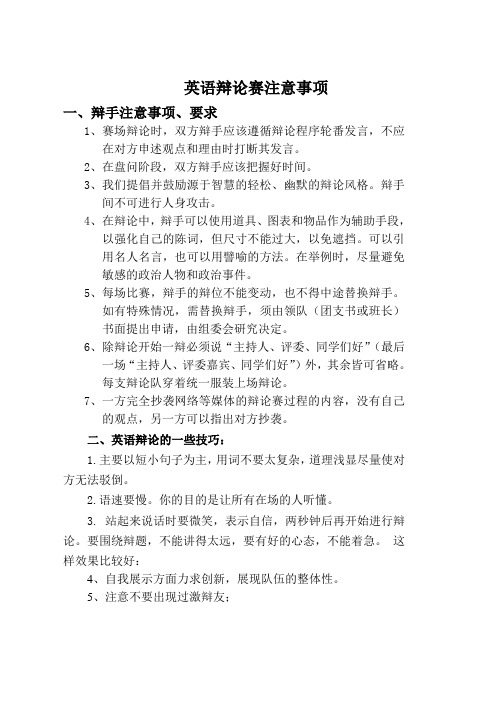
英语辩论赛注意事项一、辩手注意事项、要求1、赛场辩论时,双方辩手应该遵循辩论程序轮番发言,不应在对方申述观点和理由时打断其发言。
2、在盘问阶段,双方辩手应该把握好时间。
3、我们提倡并鼓励源于智慧的轻松、幽默的辩论风格。
辩手间不可进行人身攻击。
4、在辩论中,辩手可以使用道具、图表和物品作为辅助手段,以强化自己的陈词,但尺寸不能过大,以免遮挡。
可以引用名人名言,也可以用譬喻的方法。
在举例时,尽量避免敏感的政治人物和政治事件。
5、每场比赛,辩手的辩位不能变动,也不得中途替换辩手。
如有特殊情况,需替换辩手,须由领队(团支书或班长)书面提出申请,由组委会研究决定。
6、除辩论开始一辩必须说“主持人、评委、同学们好”(最后一场“主持人、评委嘉宾、同学们好”)外,其余皆可省略。
每支辩论队穿着统一服装上场辩论。
7、一方完全抄袭网络等媒体的辩论赛过程的内容,没有自己的观点,另一方可以指出对方抄袭。
二、英语辩论的一些技巧:1.主要以短小句子为主,用词不要太复杂,道理浅显尽量使对方无法驳倒。
2.语速要慢。
你的目的是让所有在场的人听懂。
3. 站起来说话时要微笑,表示自信,两秒钟后再开始进行辩论。
要围绕辩题,不能讲得太远,要有好的心态,不能着急。
这样效果比较好:4、自我展示方面力求创新,展现队伍的整体性。
5、注意不要出现过激辩友;6、内容要破题立论。
确立突出自己的优势空间。
拥有自己的套路,紧围辩题。
7、脱稿,只有脱稿时的语言才有感染力,顺势而上、随感而发8、辩位安排:一辩求稳;二、三辩要求现场应变能力、语言的及时组织能力以及对观点的把握能力强;四辩要求有思想、有高度、有热情,能够在情感上带动评委、观众。
9、注意场上的整体配合:(辩论赛的输赢不是仅看个人表现的好坏。
它也是对辩手默契的考验。
)10、注意肢体语言的运用:辩论赛的辩题本来就没有一个绝对的谁对谁错。
看的是谁的语言更有说服力。
恰当而又丰富的肢体语言更能增加你的说服力。
英语辩论赛资料
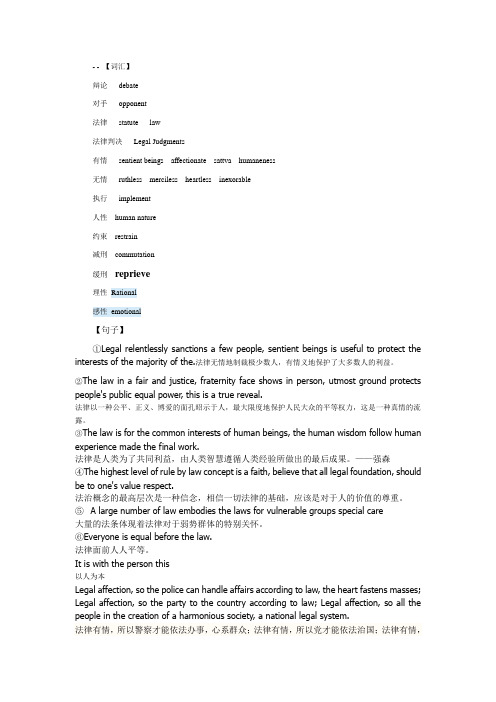
- - 【词汇】辩论debate对手opponent法律statute law法律判决Legal Judgments有情sentient beings affectionate sattva humaneness无情ruthless merciless heartless inexorable执行implement人性human nature约束restrain减刑commutation缓刑reprieve理性Rational感性emotional【句子】①Legal relentlessly sanctions a few people, sentient beings is useful to protect the interests of the majority of the.法律无情地制裁极少数人,有情义地保护了大多数人的利益。
②The law in a fair and justice, fraternity face shows in person, utmost ground protects people's public equal power, this is a true reveal.法律以一种公平、正义、博爱的面孔昭示于人,最大限度地保护人民大众的平等权力,这是一种真情的流露。
③The law is for the common interests of human beings, the human wisdom follow human experience made the final work.法律是人类为了共同利益,由人类智慧遵循人类经验所做出的最后成果。
——强森④The highest level of rule by law concept is a faith, believe that all legal foundation, be to one's value respect.法治概念的最高层次是一种信念,相信一切法律的基础,应该是对于人的价值的尊重。
辩论赛技巧英语讲稿

Good afternoon everyone. As we all know debate need a lot of skills ,the useful skills will bring perfect performance. Today I will talk about some skills about the debate competitionFirstly I will tell the skills from the three parts. Attack skill ,defensive skill and the phrase of debate competitionFor the part 1-attack skill are the most important part in a debate competition . and it will show your better eloquence and rigorous thinking ability . Now I will give some advice about the attack skills . Firstly pithy but profound questions ,we all know the more you speak ,the more mistake that you said will be found ,so in a debate ,our speaking must be brief enough and only in this way can we avoid the more mistakes.Secondly setting the dilemmas. For some questions ,there is no correct answer ,so no matter how you answer it ,it will still exist some loopholes so we an use them to attack other debatersFinally is attacking his shield with his spear . Sometimes debater’s words may exist the contradiction,so we can take advantage of the contradiction to attack their resolution.For the part 2. we all knew the attack skills are important ,but the defensive skills will be also very important .so I will tell some defensive skills .Firstly ,we should learn to use case turns. Sometimes our opponents’speaking can be taken advantage of by us .what they said will be the tools which we will use to refute them ,so how to grab the opponents words is the more usefulness skills in a debates .Secondly we should use the skill of changing the subject ,Changing the subject is the most common method to disturb the opponent’s thinking, if we can not stop opponent using the method, this debate will become others performance.Finally we have to learn to swim with the current .We can agree with their view on the surface, and then through their thinking way to set up some obstacle to make their solution be contrast to the expected. And this will give them a big surprise .For the part 3,I will tell the phrase which will be used commonly in a debate . for example ,when we want to oppose others view ,we can say。
大学生英语辩论赛技巧
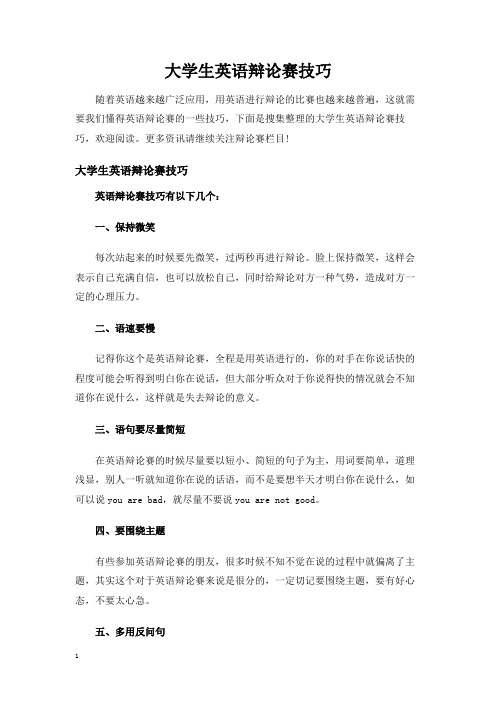
大学生英语辩论赛技巧随着英语越来越广泛应用,用英语进行辩论的比赛也越来越普遍,这就需要我们懂得英语辩论赛的一些技巧,下面是搜集整理的大学生英语辩论赛技巧,欢迎阅读。
更多资讯请继续关注辩论赛栏目!大学生英语辩论赛技巧英语辩论赛技巧有以下几个:一、保持微笑每次站起来的时候要先微笑,过两秒再进行辩论。
脸上保持微笑,这样会表示自己充满自信,也可以放松自己,同时给辩论对方一种气势,造成对方一定的心理压力。
二、语速要慢记得你这个是英语辩论赛,全程是用英语进行的,你的对手在你说话快的程度可能会听得到明白你在说话,但大部分听众对于你说得快的情况就会不知道你在说什么,这样就是失去辩论的意义。
三、语句要尽量简短在英语辩论赛的时候尽量要以短小、简短的句子为主,用词要简单,道理浅显,别人一听就知道你在说的话语,而不是要想半天才明白你在说什么,如可以说you are bad,就尽量不要说you are not good。
四、要围绕主题有些参加英语辩论赛的朋友,很多时候不知不觉在说的过程中就偏离了主题,其实这个对于英语辩论赛来说是很分的,一定切记要围绕主题,要有好心态,不要太心急。
五、多用反问句在进行比赛的时候,可以多用一些反问句来增加气势,让对方觉得你准备充足,如经常用到Don't you think that。
大家一定要记得上面所说的几点,并且多点练习就好。
大学生英语辩论赛常用语A引入自己的新观点或看法的用语Another point is that … 另一点是……Another way of looking at it is ... 看这个问题的另一个看法是 (I)forgot to say / tell you that… 我忘记要讲…...B征求他人观点或意见的用语I would be glad to hear your opinion of … 我很乐意听听你对……的意见。
Are you of the same opinion as I? 你与我的看法一致吗?I was wondering where you stood on the question of … 我想知道你对……问题怎么看。
英文辩论赛的技巧与要点
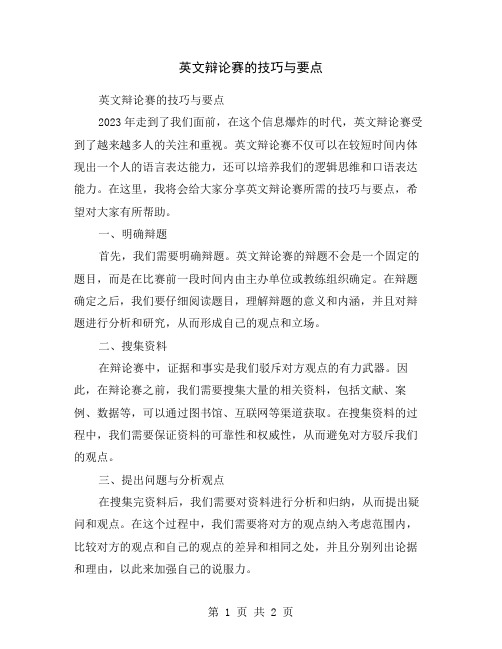
英文辩论赛的技巧与要点英文辩论赛的技巧与要点2023年走到了我们面前,在这个信息爆炸的时代,英文辩论赛受到了越来越多人的关注和重视。
英文辩论赛不仅可以在较短时间内体现出一个人的语言表达能力,还可以培养我们的逻辑思维和口语表达能力。
在这里,我将会给大家分享英文辩论赛所需的技巧与要点,希望对大家有所帮助。
一、明确辩题首先,我们需要明确辩题。
英文辩论赛的辩题不会是一个固定的题目,而是在比赛前一段时间内由主办单位或教练组织确定。
在辩题确定之后,我们要仔细阅读题目,理解辩题的意义和内涵,并且对辩题进行分析和研究,从而形成自己的观点和立场。
二、搜集资料在辩论赛中,证据和事实是我们驳斥对方观点的有力武器。
因此,在辩论赛之前,我们需要搜集大量的相关资料,包括文献、案例、数据等,可以通过图书馆、互联网等渠道获取。
在搜集资料的过程中,我们需要保证资料的可靠性和权威性,从而避免对方驳斥我们的观点。
三、提出问题与分析观点在搜集完资料后,我们需要对资料进行分析和归纳,从而提出疑问和观点。
在这个过程中,我们需要将对方的观点纳入考虑范围内,比较对方的观点和自己的观点的差异和相同之处,并且分别列出论据和理由,以此来加强自己的说服力。
四、口才表达在辩论赛中,口才表达是非常重要的。
一个表达清晰、有力的人会给人留下深刻的印象。
当我们在发言时,我们需要注意以下几点:1.用简单易懂的语言表达观点和立场,不要使用过于复杂的专业术语,让听众能够理解和接受你所说的话。
2.发言时需要注意语言的流畅性和节奏感,不要过于紧张或过于放松,注意语速适中。
3.讲话时需要注意音量和声音的抑扬顿挫,利用音调和语气的变化来强调重点和表达感情。
4.在辩论赛中,我们需要注意举手示意或插话前在脑海中构思好观点和立场,避免因不知所措而浪费时间。
五、团队合作英文辩论赛是一个团队活动,团队协作非常重要。
在团队中,我们需要相互信任,相互尊重,共同前行。
在辩论赛中,我们需要相互配合,分工明确,共同达成目标。
如何学好英语辩论

如何学好英语辩论英语辩论是一种高效的学习方法,可以帮助学生提高英语口语表达能力、逻辑思维能力和快速应变能力。
在现代社会,良好的辩论能力是十分重要的,因此学好英语辩论是非常有必要的。
那么,如何学好英语辩论呢?本文将从以下几个方面为大家介绍如何学好英语辩论。
一、建立基础知识1. 充分掌握英语基础知识要想学好英语辩论,首先要建立起扎实的英语基础知识。
包括英语词汇量、语法知识、阅读能力和听力能力等方面。
只有掌握好这些基础知识,才能更好地进行英语辩论。
2. 学习逻辑思维辩论是一种逻辑斗争,因此学习逻辑思维是非常重要的。
可以通过阅读逻辑书籍、参加逻辑思维训练班等方式来提高自己的逻辑思维能力。
3. 锻炼口语表达能力英语辩论需要大量的口语表达,因此要加强口语训练。
可以多加练习口语,多参加口语比赛,提高自己的口语表达能力。
二、参加英语辩论训练班1. 参加辩论培训班可以选择参加一些专门的英语辩论训练班。
这样可以结交到一些同好,提高自己的辩论技巧和能力。
2. 参加英语辩论社团大多数学校都有自己的英语辩论社团,可以选择加入进去。
在社团中可以积累辩论经验,锻炼自己的辩论技巧。
3. 参加比赛可以选择参加一些英语辩论比赛,这样可以锻炼自己的比赛经验。
在比赛中可以学到更多的东西,提高自己的辩论水平。
三、提高自我学习能力1. 多阅读阅读是提高英语水平的一个很好的方法,可以通过阅读英语报纸、英语杂志、英语小说等方式来提高自己的语言水平。
2. 多听听力是学好英语的一个重要环节,可以通过听英语广播、听英语歌曲、听英语讲座等方式来提高自己的听力水平。
3. 独立思考在学习英语辩论的过程中,不要只是满足于模仿,要学会独立思考。
可以通过独立思考来提高自己的辩论能力。
四、总结经验1. 及时总结经验在学习英语辩论的过程中,要及时总结经验。
可以通过写日记、写总结报告等方式来总结自己的经验,不断完善自己的辩论技巧。
2. 多加练习在学习英语辩论的过程中,要多加练习。
【辩论赛】英语辩论常识

【辩论赛】英语辩论常识英文回答,In my opinion, participating in an English debate is a great way to improve language skills andcritical thinking abilities. It provides an opportunity to research and prepare arguments on a specific topic, and then present those arguments in a persuasive and convincing manner. Through the process of debating, individuals can learn to think on their feet, respond to opposing viewpoints, and strengthen their communication skills.Debating in English also allows individuals to explore different perspectives and gain a deeper understanding of complex issues. By engaging in discussions with others, we can broaden our knowledge and develop empathy for diverse viewpoints. For example, during a recent debate on climate change, I had the chance to hear various opinions on the topic and consider new evidence that I hadn't previously encountered. This experience helped me to expand my understanding of the issue and appreciate the complexity of environmental challenges.中文回答,在我看来,参加英语辩论是提高语言能力和批判性思维能力的好方法。
英语辩论赛常用词汇和表达法汇总

英语辩论赛常用词汇和表达法汇总辩论赛English debating Competition辩论赛事debating event主办host\manage议会制辩论形式preliamentary debating style循环赛preliminary debate淘汰赛elimination debate八分之一决赛octofinals四分之一决赛quarterfinals半决赛semifinals决赛grand final正方pro side反方con side正方一辩the first debater of pro side反方一辩the second debater of con side计时员timekeeper评委打分score the competition定义要合理the definition should be reasonable素材要有说服力matter should be persuasive没有平局there is no draws in competitive commpetition一辩:first debater二辩:second debater对方辩友,my fellow debaters开始的陈词,Honorable judges, distinguished guests, ladies and gentlemen.....如果想要驳斥对方的逻辑,进行假设:according to your logicYou are missing the point!(你没有说重点!你没有围绕中心!即,他在钻洞子,这个时候他很有可能会说漏。
注意,要用are,不能说成You're,因为这样语气,士气就没有了。
)You just don't understand what we talked about!(你根本就没有明白我们刚说了什么!即:误解了,曲解了)You know what? You are straying from the main point!你知道吗?你已经跑题了!(也要注意,都用You are)自由辩论的阶段,可以在他在说的时候,插进去,说“Wait!Wait!You just said……,did you?”(当然这句话要用在,你发现对方说的不正确时~~)You are generalizing what I asked!(你在以偏盖全!即:我要你回答这个,但对方你绕过去了!)Please ask my question!(请不要回避我的问题!请你回答!!)英语辩论赛常用语A征求他人观点或意见的用语I would be glad to hear your opinion of …我很乐意听听你对……的意见。
英语辩论知识_辩论赛_

英语辩论知识英语辩论,听起来似乎很高大上,那么英语辩论究竟是什么?今天小编给大家分享一些冠以英语辩论的小知识,希望对大家有所帮助。
英语辩论知识1.是什么?英语辩论,顾名思义,要求辩手用英语进行表述,这无疑提高了辩论的难度,更具有挑战性。
在与两位同学交流的过程中,小编特意询问了英语辩论与汉语辩论的不同之处。
王晓霞表示,英语辩论采用英国议会制辩论,涉及题目更广,有时涉及到国际关系、国家政治、教育司法等问题,所以想要参加英语辩论的同学们,平时一定要多关注时事呦!2.需要准备什么?英语辩论的辩题是在比赛15分钟前给出,没有准备资料的时间,所以对知识面的考察更广泛。
为此,王晓霞每天坚持阅读,并且给自己设任务量,当她发现一些热点问题时,不仅要看新闻,更要深入新闻内部追根溯源,知道发生原因等具体细节问题。
当然了,英语辩论的前提,是日常的词汇积累和扎实的语法基础,四六级词汇手册神马的,还不赶紧翻出来,背诵走起!3.英语辩论会不会听不懂呢我可以很负责任的告诉大家,这个问题不用担心,因为一!定!会!有这样的情况!但是大家不用怕,听不懂也没关系,只要迅速的让自己冷静下来,根据中心词语来推测整个观点,做个大体的了解,再用自己的语言总结,这样就妥妥的解决了,根本不会影响比赛哒!给大家分享一些英语优秀辩手的说法:“英辩中最重要的品质,首先是大量的阅读,辩论技巧、逻辑推理很好掌握,唯有知识面是需要坚持不懈的积累,其次是自信,对自己的辩驳能力充满自信,裁判总会喜欢具有不一样气质的选手。
”“要有逻辑线条,说出一项东西,要知道如何通过自己可靠的依据将其证明出来,可以自圆其说。
与队友的合作要善于利用彼此的特长。
”“把辩论当成一种乐趣去做而不将其当成负担,当你真正融入比赛的时候,你会很享受其中的乐趣,你会听到很多不同的知识,通过不同想法的碰撞,自己对事物的接触程度会变大,自己想的也会更全面、更深刻。
”“刚入门的辩手,想到好点子却常常无法将其有逻辑有条理地表达出来,七分钟的表达时间,没有清晰的表达结构,让评委难以抓住论点,不知所云。
关于英语辩论赛的技巧
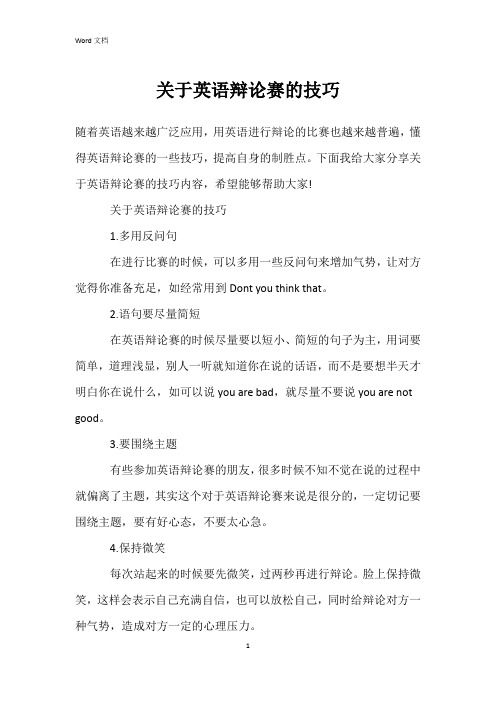
关于英语辩论赛的技巧随着英语越来越广泛应用,用英语进行辩论的比赛也越来越普遍,懂得英语辩论赛的一些技巧,提高自身的制胜点。
下面我给大家分享关于英语辩论赛的技巧内容,希望能够帮助大家!关于英语辩论赛的技巧1.多用反问句在进行比赛的时候,可以多用一些反问句来增加气势,让对方觉得你准备充足,如经常用到Dont you think that。
2.语句要尽量简短在英语辩论赛的时候尽量要以短小、简短的句子为主,用词要简单,道理浅显,别人一听就知道你在说的话语,而不是要想半天才明白你在说什么,如可以说you are bad,就尽量不要说you are not good。
3.要围绕主题有些参加英语辩论赛的朋友,很多时候不知不觉在说的过程中就偏离了主题,其实这个对于英语辩论赛来说是很分的,一定切记要围绕主题,要有好心态,不要太心急。
4.保持微笑每次站起来的时候要先微笑,过两秒再进行辩论。
脸上保持微笑,这样会表示自己充满自信,也可以放松自己,同时给辩论对方一种气势,造成对方一定的心理压力。
5.语速要慢记得你这个是英语辩论赛,全程是用英语进行的,你的对手在你说话快的程度可能会听得到明白你在说话,但大部分听众对于你说得快的情况就会不知道你在说什么,这样就是失去辩论的意义。
辩论战术1.划分战场基本的做法是把一系列关系紧密的问题作为一个战场,并由场上的一名队员提出其中的第一问题,其他队员立即跟上,直到问完这一系列问题,取得了满意战果后,转入下一战场。
这种战术的优点是:火力集中,进攻显得有章法,有层次。
缺点是:有时过于死板,为了贯彻连续提问,对对手临场暴露的弱点只能作简单攻击,而对对手的有力反驳又不能由最恰当的队员来防守,这和自由辩论随机应变的特点是相背离的。
结论:仍然可以适当决定几个战场,但不用强求连续提问,让队员自己控制提问的时机。
2. 两次发言在自由辨论中,一个队员发言后,不要立即把话筒传给其他队员,而在对方发言后,由其自己决定是否作第二次发言。
关于英语辩论赛的技巧2017
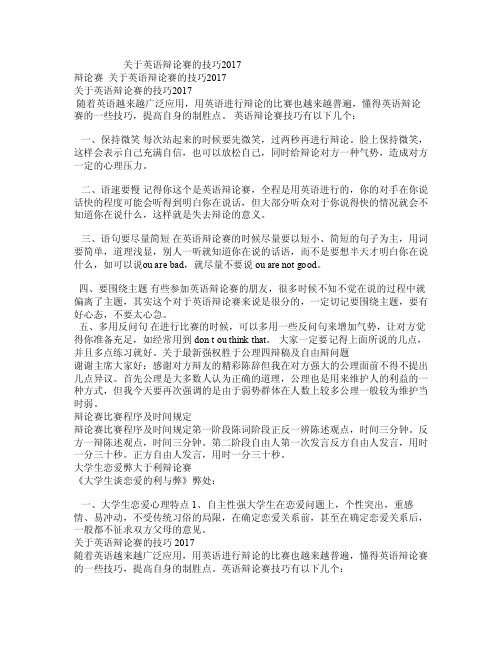
关于英语辩论赛的技巧2017辩论赛关于英语辩论赛的技巧2017关于英语辩论赛的技巧2017随着英语越来越广泛应用,用英语进行辩论的比赛也越来越普遍,懂得英语辩论赛的一些技巧,提高自身的制胜点。
英语辩论赛技巧有以下几个:一、保持微笑每次站起来的时候要先微笑,过两秒再进行辩论。
脸上保持微笑,这样会表示自己充满自信,也可以放松自己,同时给辩论对方一种气势,造成对方一定的心理压力。
二、语速要慢记得你这个是英语辩论赛,全程是用英语进行的,你的对手在你说话快的程度可能会听得到明白你在说话,但大部分听众对于你说得快的情况就会不知道你在说什么,这样就是失去辩论的意义。
三、语句要尽量简短在英语辩论赛的时候尽量要以短小、简短的句子为主,用词要简单,道理浅显,别人一听就知道你在说的话语,而不是要想半天才明白你在说什么,如可以说o u are bad,就尽量不要说ou a re no t goo d。
四、要围绕主题有些参加英语辩论赛的朋友,很多时候不知不觉在说的过程中就偏离了主题,其实这个对于英语辩论赛来说是很分的,一定切记要围绕主题,要有好心态,不要太心急。
五、多用反问句在进行比赛的时候,可以多用一些反问句来增加气势,让对方觉得你准备充足,如经常用到do n t o u thi nk th at。
大家一定要记得上面所说的几点,并且多点练习就好。
关于最新强权胜于公理四辩稿及自由辩问题谢谢主席大家好:感谢对方辩友的精彩陈辞但我在对方强大的公理面前不得不提出几点异议。
首先公理是大多数人认为正确的道理,公理也是用来维护人的利益的一种方式,但我今天要再次强调的是由于弱势群体在人数上较多公理一般较为维护当时弱。
英语辩论常识

英语辩论常识(一)affirmative(正方)negative(反方)topic:辩题辩论赛 debate辩手 debater正方 positive side反方 negative side对方辩手 my fellow debater正方Government :1)一辩 Prime Minister 2)二辩 Member of the Government反方Opposition :1)一辩Leader of the Opposition 2)二辩Member of the Opposition(二)常用短语荟萃1. stating an opinion 陈述观点a. in my opinion… 我的意见是……b. personally I think…… 我个人认为……c. I believe that…… 我相信……d. I think that…… 我觉得……e. the point is that…… 我的观点是……f. if you ask me…… 如果你问我……g. I’d like to say this:…… 我会这样说……h. I’d like to point out that 我想指出的是……i. speaking for myself 站在自己的立场上说……j. as far as I’m concerned,… 就我而言,……k. in my experience… 根据我的经验……2. challenging an opinion 质疑某种观点a. that can’t be true 那不可能是真的。
b. but what about…? 但关于……方面呢?3. clarifying a point 阐述观点a. what I said was… 我刚才说的是……b. what I mean to say was… 我的意思是说……c. let me repeat what I said. 让我重复我刚才所说的。
英语辩论常识

英语辩论常识一、定义英语辩论,也称为英语口语辩论,是一种在英语语言环境中进行的辩论形式。
它通常涉及对特定主题或问题的讨论和争辩,旨在清晰明确地表达观点、推理和证据,并听取和理解对方观点。
二、辩论的目的英语辩论的目的是多方面的。
首先,它可以帮助提高英语口语技能,包括语法、发音、词汇和听力。
其次,辩论还可以培养批判性思维和逻辑推理能力,包括对信息的分析、评估和归纳能力。
此外,辩论还可以帮助培养沟通技巧,包括表达观点、反驳他人观点和达成共识的能力。
三、辩论的规则英语辩论通常遵循一定的规则和程序。
以下是一些常见的规则:1.准备充分:辩手需要在比赛前对辩论的主题和相关资料进行深入研究和分析。
2.尊重对方:辩手需要尊重对方观点,避免使用攻击性或侮辱性的语言。
3.表达清晰:辩手需要清晰明确地表达自己的观点和证据,避免使用含糊不清的语言。
4.逻辑连贯:辩手需要使自己的发言具有逻辑连贯性,避免跳跃或无关的讨论。
5.遵守时间:辩手需要在规定的时间内完成发言,避免超时或拖延。
四、辩论的技巧英语辩论需要掌握一些技巧,以下是一些常见的技巧:1.掌握语言技巧:包括发音准确、语法正确、用词恰当等。
2.分析论证技巧:包括分析问题、提出观点、支持论点等。
3.倾听技巧:包括认真听取对方观点、理解对方意图等。
4.组织发言技巧:包括安排发言结构、使用逻辑线索等。
5.非语言交际技巧:包括肢体语言、面部表情等。
五、辩论的常见类型英语辩论有几种常见的类型,包括政策辩论、议会辩论、法庭辩论等。
政策辩论是最常见的类型之一,它通常涉及对公共政策问题的讨论和争辩。
议会辩论是一种在模拟议会环境中进行的辩论形式,通常涉及对政治议题的讨论和争辩。
法庭辩论是一种在模拟法庭环境中进行的辩论形式,通常涉及对法律案件的讨论和争辩。
六、如何提高英语辩论能力提高英语辩论能力需要多方面的努力和实践。
以下是一些建议:1.提高语言技能:包括发音、语法、词汇等方面。
可以通过阅读、听力、口语练习等方式来提高语言技能。
- 1、下载文档前请自行甄别文档内容的完整性,平台不提供额外的编辑、内容补充、找答案等附加服务。
- 2、"仅部分预览"的文档,不可在线预览部分如存在完整性等问题,可反馈申请退款(可完整预览的文档不适用该条件!)。
- 3、如文档侵犯您的权益,请联系客服反馈,我们会尽快为您处理(人工客服工作时间:9:00-18:30)。
英语辩论赛不能不懂的知识
应该如何去认识辩题的15种类型?
辩论的种类层出不穷,判断清楚辩论的类型则极为重要,今天就是集中谈一下应该如何去认识辩题的15种类型?1、是非辩题你说是而我就是说不是的。
如:离婚率上升是社会文明的表现[不列出反方观点,下同]这种类型的辩题我认为,其实主要辩题的切入点正方主要是在立法的方
辩论的种类层出不穷,判断清楚辩论的类型则极为重要,今天就是集中谈一下应该如何去认识辩题的15种类型?
1、是非辩题
你说是而我就是说不是的。
如:离婚率上升是社会文明的表现[不列出反方观点,下同]这种类型的辩题我认为,其实主要辩题的切入点正方主要是在立法的方面下手,反方的切入点主要是社会现象暴露的社会问题。
而是非形式的辩题我认为,主要抓住事物的两方面来考虑这样才能找到正确的方法,来诠释本题的要义。
2、比较辩题
将二者做比较的辩题,如:事业比爱情更重要。
这类辩题主要是抓住,题中涉及到的“更”字来进行讨论。
有很多的朋友在讨论这样的辩题时经常习惯用否定的观点来看待对方观点,这也是辩论中对辩题理解的一个误区。
3、利弊辩题
利弊分析型辩题,如:大学生在校期间做家教的利弊。
这种辩题涉及的范围比较广,需要大量的资料来支持。
所以在辩论的技巧上要学会应用对方观点或阐述上的失误尽可能的使其成为己方观点的一部分。
4、可否辩题
即如果这样可以,则那样不可以的辩题,如:儒家思想可以抵御西方歪风。
这种辩题主要针对的事物或事理。
在辩论中经常会有一些主观的思想回影响到辩者的思路,所以这类辩题也是大家对事物或事理两面性观察的一个要点。
5、可能辩题
即可能与不可能的辩题,如:生态危机可能导致人类灭亡。
这类辩题中需要大量的专业资料,在说明问题过程中,有会有根据已有资料的新观点或论断来支持己方观点。
由此辩论的焦点就在于对资料的消化和理解上,而对于辩论本身来讲锻炼的是辩者对事物敏锐的观察力。
6、前提辩题
即谁是谁的前提类辩题,如:经济发展应该以教育发展为前提。
这类辩题的破解主要是以分析事物或事理相互作用的过程为主要的内容。
因为只要是提及到前提的问题就一定两事物或事理难以分开,互相渗透,所以也是对辩手寻源能力的培养,在对辩题的分析中多问问是什么?为什么?怎么半?其中的共同点又是什么?
7、应该辩题
即应该这样不应该那样的辩题,如:愚公应该搬家。
这类辩题主要是以道理、原因使其作为辩论的主题,辩论中会有大量的质疑产生而导出结论,是锻炼辩手多重思维,普遍联系的重要手段。
8、先后辩题
即判断谁先谁后的辩题,如:德为才先。
这类辩题需要注意,立论时的落脚点,并且需要整个辩论队伍需要高度的统一思想。
因为这样的辩题不仅是说明问题是这样的问题,其最主要的关键就在于,己方观点的逻辑链条是否完整。
所以也是锻炼辩手,逻辑思维的重要手段。
9、轻重辩题
判断谁轻谁重的辩题,如:人类社会应该重义轻利。
这种辩题中正反双方的观点的交叉教为明显,需要对对方观点进行更深入的分析才是这类辩题破题的关键,是从对方的立场来思考己方观点的一种方法,俗话说:知己知彼就是这样!
10、对立辩题
即对双方而言尖锐对立,水火不相容的辩题。
如:不破不立。
这种辩题中经常在辩论场上最为精彩的一类比赛。
越是具有个性的队伍在这种辩论中越是具有优势。
我提到的个性话的队伍是指所有的成员具有很明显的不同的辩论风格!
11、本末辩题
即谁为本谁为末的辩题,如:人性本善。
这类辩题中一般都是具有相同的前提以供参考,而得出相反的结论。
破解这类的辩题主要是要抓住如环境、内因、外因……的共同作用所导致的相关结果。
而这种辩题的存在形式正式,当年辩论初形成的那种作用与意义,即寻求真理。
12、主次辩题
即判断谁主谁次的辩题,如:学生以学习知识为主。
这个辩题主要是谈的是因果关系。
而破解的方式,经常采用几何中反证法的形式出现。
13、必然辩题
即必须如此而不能如彼的辩题,如:效率必然牺牲平等。
这种辩题正方主要抓住成因作为立论的依据,而反方的灵活行较大。
可以自己建立多重的理论模式,但同样也拉长了战线。
所以针对正方的有利资料进行有针对性的立论是很必要的。
14、必要辩题
即必要与不必要的辩题,如:温饱是谈道德的必要条件。
这种类型与谈前提的辩题内容差不多,主要是在必要性上做文章,而所有资料也必须围绕着必要这一前提进行讨论。
这就需要对资料进行精练和归纳这样才能用更加合理的内容证明必要存在的合理性。
15、大小辩题
即谁大谁小的辩题,如:义大于利。
这类辩题实际上需要一个前提,也是立论形成的载体,这个载体可能是一个行业、一个阶段、也可能是历史的某一段,只有限定在一个对己方有利的前提下才能使己方的优势充分的发挥出来,这也是一只队伍势力和能力的最好展现的一类辩题。
将这15类辩题,归纳一下则是:
A:大小
B:是非
C:先后
D:主次
E:轻重。
